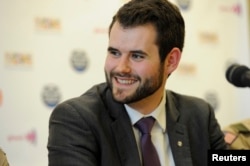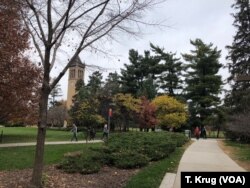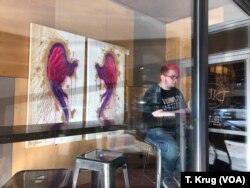LGBTQ activists in Iowa say they are encouraged by the progress in their fight for equality despite occasional setbacks in the Midwestern state.
The shifting and sometimes contradictory attitudes toward that community are keenly felt by Zach Wahls, an LGBTQ advocate and candidate for a seat in the Iowa Legislature.
Wahls made national headlines in 2011 when he spoke about being raised by a lesbian couple during a public hearing of a legislative committee on whether to ban gay marriage. A video of that speech went viral.
Like many LGBTQ activists, who note President Donald Trump's efforts to bar transgender individuals from serving in the military and his appointments of judges with a record of ruling against LGBTQ rights, Wahls feels that the administration "has put transgender people in the crosshairs."
But when he repeats the story he told in 2011 on the campaign trail, he finds people "energized" by it. "Even if they disagree with same-sex marriage, or have some views in terms of LGBT identity that I would disagree with, most people have the 'live and let live' perspective," he said.
That doesn't mean everyone is on board.
Last month, to protest the second annual pride festival parade in the town of Orange City, a Christian activist live-streamed himself burning four library books. The titles included Two Boys Kissing and Families, Families, Families! about non-traditional families. Orange City is part of Sioux County, which is among the most conservative counties in the state.
The condemnation from several groups was immediate. Since then, GoFundMe pages have raised more than enough money for the Orange City public library to replace the books.
When asked to respond to the book burning, Daniel Hoffman-Zinnel, executive director of One Iowa, an organization that promotes LGBTQ equality, focused instead on the progress his community has made in a largely rural state with strong religious ties.
More than 200 people attended the pride festival parade, Hoffman-Zinnel said. "So, having pride happen in this area is amazing."
While careful not to diminish the negative experiences of some people, Mark Stringer, executive director of the American Civil Liberties Union in Iowa, pointed to the state's record of passing legislation promoting justice for women, members of the LGBTQ community and people of color.
"If you look at our history as a state, you'll see that we are ahead of the curve," said Stringer, whose group has opposed infringements on civil liberties from both the right and the left. "I've seen a lot of movement in a greater understanding of the challenges and discrimination that transgender people face."
Stringer and Hoffman-Zinnel pointed to state laws in Iowa that would block some proposed federal efforts to roll back protections for LGBTQ individuals. In 2007, the state legislature passed a law banning discrimination based on sexual orientation or gender identity. Two years later, Iowa became one of the first states to allow gay marriage.
"In Iowa, we have some of the best policies on the books. That being said, the emotional damage that has already happened should not be overlooked," Hoffman-Zinnel said.
Freddi Funnell of Ames, a college town that leans liberal, founded a support group last year with his teenage child, who is agender. While there are several support groups in town — especially on the campuses of Iowa State University, the high school, and even the middle school — Funnell said there was still a gap in supporting trans and non-binary people.
On a good day, Funnell said, around 15 people, ranging in age from elementary students to senior citizens, attend the group's meetings.
"So, it just goes to show that a community group was needed," Funnell said.
After coming out as gay two decades ago — he said he wanted to come out as transgender but feared losing friendships — Funnell was frequently targeted.
"My senior year of high school, I bought 16 new tires because they just kept slashing them," he said.
At 25, he was diagnosed with cancer and had a near-death experience. It spurred him to come out as transgender.
"I was like, I have a second chance at life, I can't be unhappy. I can't hide who I am. It's time to let go of the idea that I have to stick to one label,'" Funnell said.
He was surprised by the reaction.
"Just that 10 years had changed enough in society, in social media and everything, that I didn't get any pushback like I had prior," he said.
Funnell generally credits Ames residents and businesses with being supportive of the transgender community. He said area physicians are good about getting training to provide appropriate health care for transgender people, something that residents in other parts of the state say they lack.
However, statements and actions from the Trump administration have led to fear of backlash within the transgender community.
"I do know in some of the rural communities, it's not as nice — where they've reached out to me, or they've moved, because it's too bigoted, and they don't feel safe," Funnell said.
Several transgender people living in rural areas declined to speak to VOA for this article, or did not respond to requests to be interviewed.
Rather than retreat, Funnell said now is the time to promote education and give more exposure to the LGBTQ community.
"A lot of people are fed up right now, but we're not going to stop fighting," he said.







